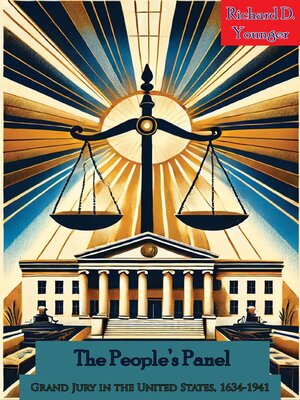
Sign up to save your library
With an OverDrive account, you can save your favorite libraries for at-a-glance information about availability. Find out more about OverDrive accounts.
Find this title in Libby, the library reading app by OverDrive.



Search for a digital library with this title
Title found at these libraries:
| Library Name | Distance |
|---|---|
| Loading... |
The People's Panel: Grand Jury in the United States, 1634-1941 by Richard D. Younger is a comprehensive and insightful exploration of the grand jury system, tracing its origins, evolution, and role in American history. Spanning over three centuries, Younger examines how this institution—rooted in English common law—was adapted and developed in the unique political and social landscape of the United States.
The book delves into the grand jury's dual role as both a tool of justice and a guardian of citizens' rights, providing an in-depth look at its function in criminal investigations and its capacity to check governmental authority. Younger explores significant moments in the history of the grand jury, including its role in colonial governance, its contributions during pivotal legal reforms, and its challenges in maintaining impartiality during times of political and social upheaval.
Through detailed analysis and engaging storytelling, Younger highlights how the grand jury has been both celebrated for its commitment to justice and criticized for its susceptibility to corruption, bias, and inefficiency. By contextualizing these issues within the broader framework of American legal and political development, The People's Panel sheds light on the complexities and contradictions of this enduring institution.
Ideal for historians, legal scholars, and anyone interested in the evolution of American democracy, this book provides a rich and thought-provoking account of how the grand jury has shaped—and been shaped by—the nation's history.
The book delves into the grand jury's dual role as both a tool of justice and a guardian of citizens' rights, providing an in-depth look at its function in criminal investigations and its capacity to check governmental authority. Younger explores significant moments in the history of the grand jury, including its role in colonial governance, its contributions during pivotal legal reforms, and its challenges in maintaining impartiality during times of political and social upheaval.
Through detailed analysis and engaging storytelling, Younger highlights how the grand jury has been both celebrated for its commitment to justice and criticized for its susceptibility to corruption, bias, and inefficiency. By contextualizing these issues within the broader framework of American legal and political development, The People's Panel sheds light on the complexities and contradictions of this enduring institution.
Ideal for historians, legal scholars, and anyone interested in the evolution of American democracy, this book provides a rich and thought-provoking account of how the grand jury has shaped—and been shaped by—the nation's history.







